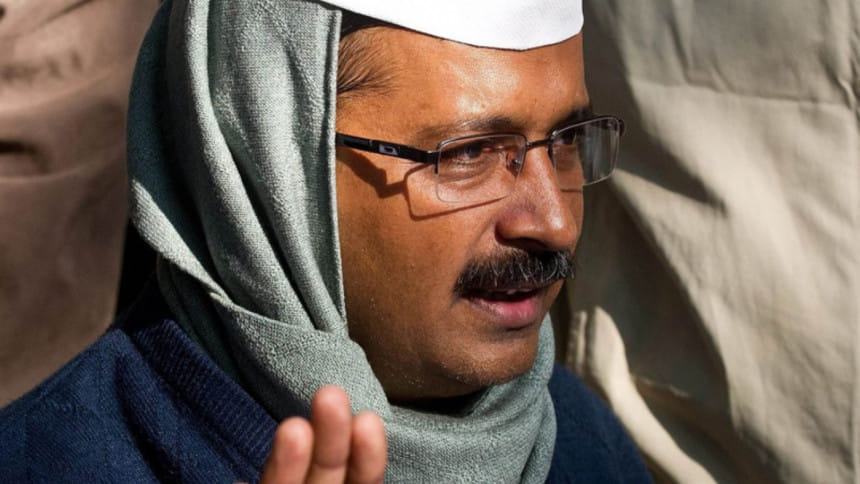AAP's democratic deficit

THE Aam Aadmi Party became the great white hope of Indian democracy in February when it stopped the Modi juggernaut in Delhi with a spectacular election victory. But less than two months later, it got drawn into an ugly internal conflict, leading to the purge of Yogendra Yadav and Prashant Bhushan from its national executive.
These were the party's best-known faces after Chief Minister Arvind Kejriwal. But neither they nor Kejriwal emerged from the conflict smelling of roses.
The confrontation exposes a big democratic deficit in a party whose very rationale was to democratise Indian politics and free it of corruption and opacity. Many people who had invested great hopes in 'AAP the experiment' feel let down by 'AAP the party.'
The episode weakens secular-democratic forces and the cause of justice, while strengthening the forces of communal intolerance, authoritarianism and iniquity.
The Yadav-Bhushan purge was triggered by both personal ambitions and political differences. Kejriwal, with his authoritarian personality, had no use for equal stakeholders in the enterprise called AAP. He saw AAP as his own proprietorship. He also resented the fact that Yadav wanted AAP to contest the Haryana elections, which would have diverted attention from the Delhi polls.
The Yadav-Bhushan duo requested Kejriwal to step down as national convenor once he became Chief Minister. Kejriwal saw this as a threat—although it's legitimate politics. He adopted a winner-takes-all approach.
Kejriwal played rough, relying on "sting" operations and using bouncers at the March 28 meeting. It's wrong in principle to record private conversations. Democratic politics entails the highest respect for privacy, or it'll create a spy state. It's illegitimate to use stings as "evidence", and unethical to leak it to journalists.
The Yadav-Bhushan duo used identical tactics. Yadav is also guilty of double-standards. He invoked respect for dissent, but put down dissidents in Haryana.
On balance, Kejriwal is more blameworthy. He made a unilateral flip-flop on dissolving the Delhi Assembly. Second, he allowed AAP to accept dubious donations, without getting directly involved. Third, his decision-making was despotic.
This is not to underrate Kejriwal's historic performance in Delhi's election. But politics isn't about elections and personalities alone. It's also about Delhi's poor wanting to punish Modi's pro-rich elitism, "56-inch" arrogance and divisive Hindutva. Kejriwal became the man of the moment who articulated these sentiments.
There was nothing inevitable about AAP becoming extremely personalised. AAP could have forged a collective leadership. But it made that task difficult by rejecting all ideology, and making a virtue of the absence of a programmatic framework. With the recent purge, it has squandered that chance.
AAP is becoming a "Kejriwal and clones" party. His young Hindi-speaking admirers who quit well-paying IT industry jobs see him as a demigod; he's comfortable with them.
This cabal, as AAP's sacked Lokpal L Ramdas put it, is an "all boys' club". There are no women in Kejriwal's cabinet, and now, none in AAP's national executive. This is deplorable.
AAP has a bright future in Delhi and will remain nationally relevant as a potential pole of attraction. Its expansion to other states will depend on whether it takes some worthy pro-people measures in Delhi. Its first three major moves fall short of expectations.
First, its government is scrapping the Bus Rapid Transit system—the long-term, equitable solution to Delhi's horrendous transportation problem, 15-20 times cheaper than the Metro, which faced sabotage in its very first stage. AAP didn't bother to study the BRT before scrapping it. Nor has it consulted anyone, least of all bus commuters, thus betraying its promise.
Second, it has banned the sale of all kinds of chewing tobacco. This is illogical when cigarette and beedi sales aren't banned. The ban will only drive the business underground.
Third, the government has decided to supply every family 20,000 litres of Delhi Jal Board water free every month, corresponding to 140 litres per person per day (lppd). This is excessive. What's really needed is reliable supply.
Studies show that a person doesn't need 140 litres (over 10 buckets) a day. Realistic estimates are 50-60 litres (highest, 85 litres).
Giving water free will encourage waste, waterlogging, pollution and disease. It will prevent AAP from addressing the real issues: huge wastage, exclusion of the poor, and consumption disparities.
Fifty-four percent of DJB-supplied water is wasted. DJB pipelines don't reach one-third of households. The poorest have to buy exorbitantly priced water from mafia-controlled tankers. The mafia mines water haphazardly, contaminates groundwater and lowers the water-table.
Sixty-two percent of households get less than 50 lppd, and 25 percent less than a paltry 20 lppd. But 17 percent, living mainly in posh bungalows and flats, get 390 lppd.
The top priority is to reduce waste, extend pipelines, meet the needs of the bottom 25 percent, and double the number of meters. AAP has ignored these realities.
AAP must think its policies through critically, and with great seriousness. Or there's a real danger that despite its pro-poor intentions it will end up pleasing the elite and alienating its own base. That would be tragic for Indian democracy.
The writer is an eminent Indian columnist.
E-mail: [email protected]

 For all latest news, follow The Daily Star's Google News channel.
For all latest news, follow The Daily Star's Google News channel. 



Comments